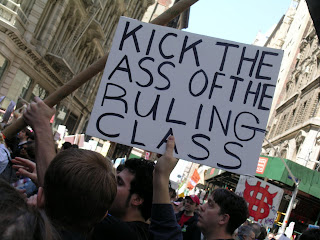
In his reflections on the various approaches of how the ruling class wields power in the society, Goran Therborn considers the subject of such power and the extent of such power as exercised. Like Marx and Weber who have their respective definitions of class, Therborn asserts that class may be defined in who exploits whom. The ones in power—whether they be the elite, the military, the politicians, the capitalists—exploit the powerless in order to perform that which they do when they rule. First of this functions is to stay in their ruling position and the next is to be accountable for social change.
The ruling class has to maintain its imperial position of having power over the ruled. It conducts this by using its power to reproduce a particular form of exploitation and domination. For the elite class, it has to use its money to stay up the social ladder. Money is its power in order to have influence over others. Using money, the elite can have the privilege of not having to work by, say, establishing businesses, in which case they become capitalists. It can also have the privilege of controlling the bureaucracy by dictating the government under the threats of withdrawing its material support which is power lent to a temporary ruler. Meanwhile, for the military, it has to use its armament to keep social order. Using its power, the military rules over the civilians who, being private, do not have the privileged access of government funds for defense. Guns and other forms of arm mechanisms can be used to safeguard social order or worse, to threaten the civilians into silence, as may be seen in military juntas or dictatorships. Also, the politicians can use their position to influence bureaucratic transactions that will prolong their power or extend their influence. This can be ascertained by certain officials who are hell-bent into changing the constitution in order to wield dictator-like dominion over the citizens. Finally, the capitalists maintain their ruling position by keeping low wage for the laborers and amassing all the surpluses porduced from their capital and properties. In this case, it is they who have upward mobility instead of the laborers who produced the very suprplus which constitutes their power.
It cannot be said that these power-trippers account for social change, since they need their power to keep ruling the ruled. There is little development in the society caused by these exploiters. They even use the state apparatuses in order for their power to proliferate. This they do by their continued pratice of power mentioned above. They may be distinct rulers from each other, but they are interrelated by their capacity to duplicate exploitation and domination over their subjects. They use state power to exploit the rules for their own benefits.
Gleaning from this situation, I understand that the power struggle between the ruler and the ruled should be settled before there can be real social change. Since the ruler has the power to facilitate this, it is the one mainly responsible for the generation of development. All the subjects of pwer can do is to resist the exploitation made by the ruler and this can be in the form of a protest, or even a revolution. The ruler is irreparably driven to keep its power, but only when it feels the ruled can overwhelm it that it may be permissive to social change.



.jpg)





















No comments:
Post a Comment